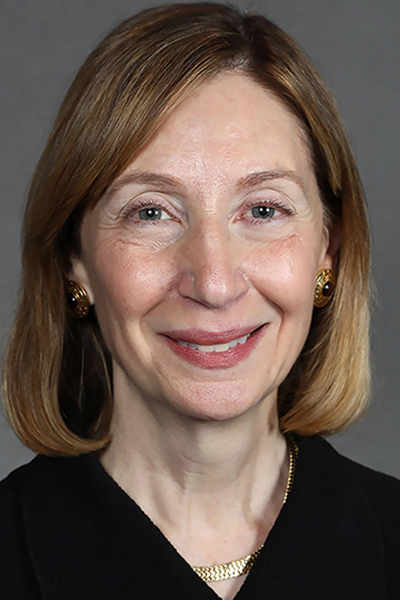
The term of ACR President Ellen M. Gravallese, MD, came amid the most challenging of circumstances, but the adversity and lessons from the COVID-19 pandemic, and the perseverance of the rheumatology community she has witnessed firsthand, do offer comfort and hope that the field will enter a new era and become an even more essential and sought-after specialty.
Dr. Gravallese welcomed ACR Convergence 2020 participants to the first all-virtual annual meeting during her Presidential Address that started the Opening Session: Rheumatology’s Strengths: Science and Resilience on Thursday, Nov. 5. Registered annual meeting attendees can access the session on demand until March 11, 2021.
Dr. Gravallese called the rheumatology field’s response to the pandemic “nothing short of remarkable.” Physician-reported registries have sprung up worldwide, collecting information about patients with rheumatic diseases who contract COVID-19, delivering data to help fill the lack of data concerning patient outcomes. In the United States, the ACR and its members have addressed the crisis with resilience, collaboration, and creative solutions to new challenges, Dr. Gravallese said.
“We do this because we care, deeply,” she said. “We care about our patients, about science, about our specialty, and about each other.”
Dr. Gravallese outlined the lessons learned during the past year:
- As the content experts in immunology, rheumatologists are highly relevant: Rheumatologists understand better than any other specialty the pharmacologic and therapeutic issues surrounding cytokine blockade and the risks and benefits of immunosuppressive therapies. “We should embrace this strength and utilize immunology expertise, not only in the direct care of patients, but also in the design and implementation of new clinical trials and in the development and use of vaccines. We should always be in the room where it happens. Rheumatologists should be advising hospital teams caring for patients with all diseases that impact the immune system.”
- In order to respond rapidly in a crisis, we need to rethink the ACR’s organizational structure: The ACR has realized that it needs a more nimble approach to answer members’ concerns in real time. Several task forces provided needed practice guidance, and the ACR has also created a task force to address its governance structure. “The ACR needs mechanisms that will allow for rapid and effective response to issues as they arise in our specialty and needs to be organized differently to address issue common to multiple committees. Although the task forces implemented during the pandemic have been very effective and efficient, we need a better approach going forward,” Dr. Gravallese said.
- We can’t do this alone: Collaboration with experts in other fields of medicine is critical. “The artificial silos of medical subspecialties and departments ultimately needs to break down, and we should consider a new structure of medical care focused on disease mechanisms rather than clinging to our traditional organ-based thinking,” Dr. Gravallese said.
- Telehealth is changing the way we practice medicine, but is it a “virtually perfect” solution? The ACR’s lobbying efforts helped remove some of the regulatory barriers for telehealth visits. In the future, telehealth visits must be maintained, Dr. Gravallese said, but, “We should continue to hold the physical exam in high esteem, and insist on seeing our patients in person between telehealth visits to identify and confirm suspected physical findings. And we should also embrace new technologies that could allow us to assess certain aspects of the exam remotely, perhaps, for example by using infrared technology to identify inflamed joints.”
- Educational meetings will never be the same: ACR Convergence 2020 is an experiment in remote education, Dr. Gravallese said. The ACR is rethinking how to deliver lectures, manage Q&As, and discuss critical new scientific concepts without losing the critical need to make personal connections with colleagues. “We should work to look forward to hybrid meetings, embracing remote learning, in part, while maintaining in-person exchange of knowledge and ideas,” Dr. Gravallese said. “We have all struggled with the personal isolation that this pandemic has imposed upon us. And we have been acutely reminded of the importance of the connection with our rheumatology colleagues locally and around the world.”
- We are a global society, facing common issues relevant to the global community: The pandemic has shown the possibilities of almost instantaneous connection to others to solve problems collaboratively across borders. While many challenges remain today, the pandemic will end. “During my term as president, I have seen that in this most difficult of years rheumatologists across the globe have come together. You have thought creatively on how to address the challenges faced by this pandemic, how best to serve the patients who depend on us, and how to continue to move research forward in our field. Every single person who was asked to assist the ACR in our efforts to respond to this pandemic has risen to the occasion without hesitation,” Dr. Gravallese said.
The session also included the 2020 keynote address from Eric Rubin, MD, editor in chief of The New England Journal of Medicine and chair of the Department of Immunology and Infectious Diseases at the Harvard T.H. Chan School of Public Health, and the annual Year in Review session. Visit ACR Convergence Today on Saturday, Nov. 7, for complete coverage of those events.
